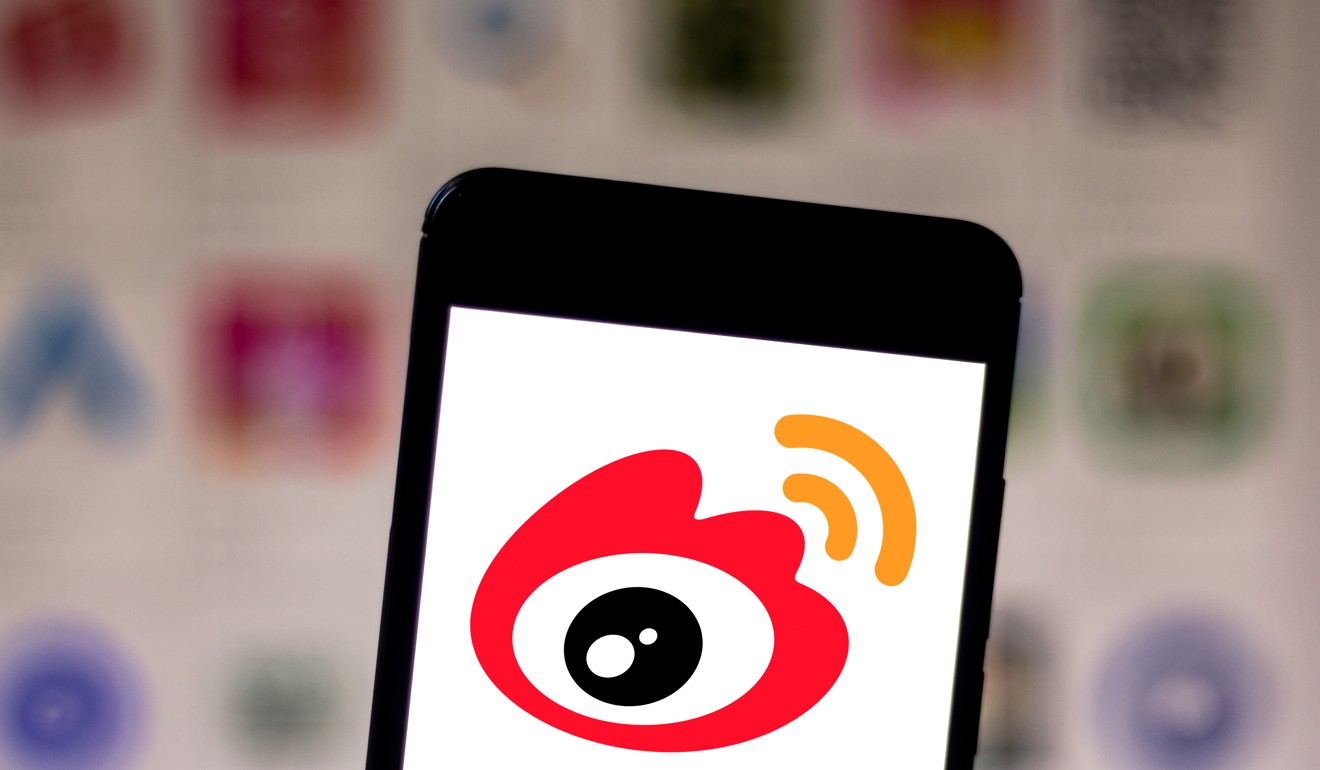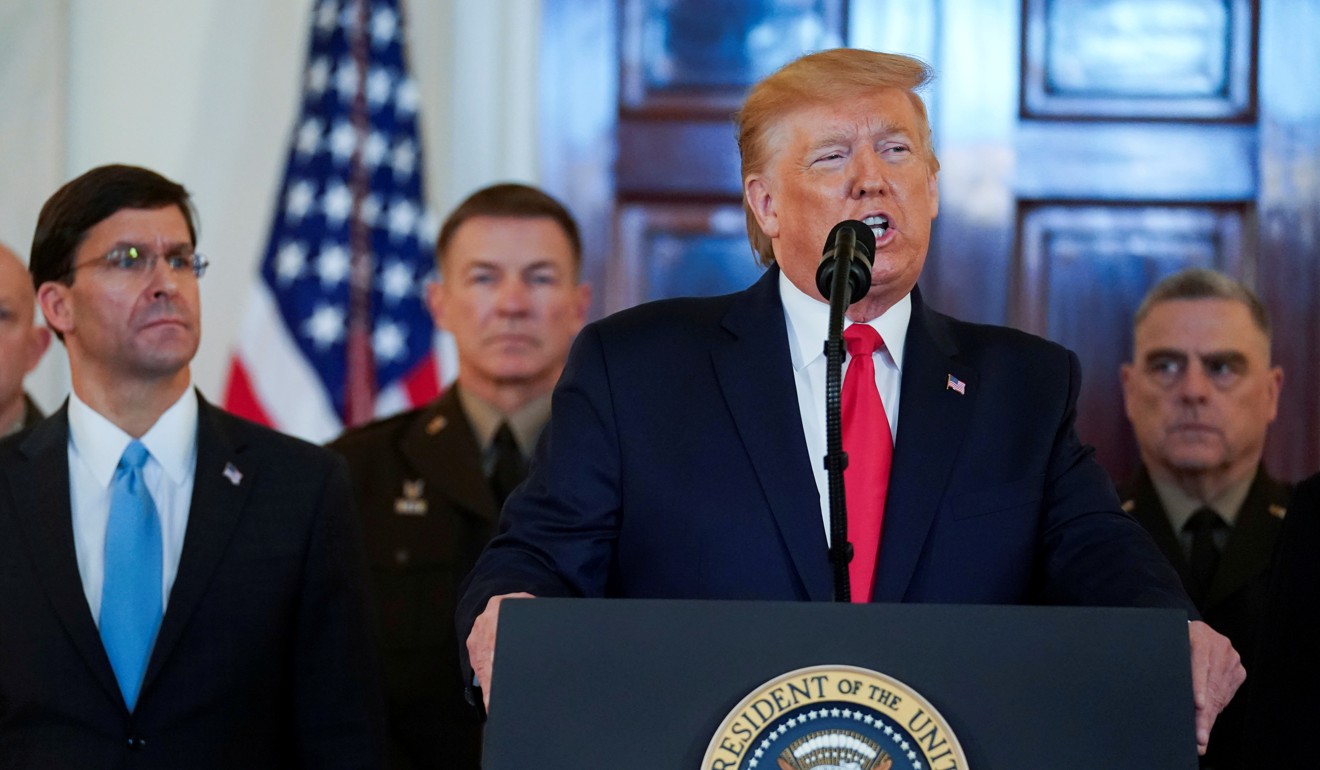
Chinese social media users watch war of words unfold between Iran and US
- The two embassies in Beijing traded barbs on Weibo as tensions rose following the killing of Qassem Soleimani
- While some Western outlets have censored posts supporting the late military commander, one observer said Beijing was happy to let the dispute play out to highlight its role as an ‘arbiter’
Chinese internet users have been watching US and Iranian diplomats trading insults on the social media platform Weibo as tensions between the two countries escalated following the US missile strike that killed senior military commander Qassem Soleimani.
Soleimani, the head of the Islamic Revolutionary Guard’s elite Quds Force, was killed in an air strike near Baghdad airport after Iranian-backed militias attacked the US embassy.
His death prompted mass anti-US protests in Iran and Iraq, while Tehran also retaliated with a missile attack on a US base.
While some Western social media outlets such as Facebook and Instagram were reported to have censored pro-Iranian posts to comply with US sanctions, Weibo – which is subject to China’s strict censorship regime – was happy to give the country’s diplomats free rein to make their case.

Three days after the January 3 missile strike that killed Soleimani, Iran’s embassy in Beijing posted a translation of a tweet from the country’s foreign minister, Mohammad Javad Zarif, addressed to Donald Trump.
He pointed to the large crowds mourning Soleimani, asking: “Have you ever seen such a sea of humanity in your life? Do you still want to listen to the clowns advising you on our region? And do you still imagine you can break the will of this great nation and its people?”
He described the event as marking the end of the “malign US presence in West Asia”, which the embassy in Beijing translated as the “end of the evil forces of the US”.
In the next few days, that phrase repeatedly appeared in the Iranian embassy's Weibo posts, while the US embassy struck back accusing Soleimani of exporting terrorism, fanning sectarian violence and causing thousands of deaths.
In contrast, the US embassy’s Twitter account has made fewer comments on the dispute and largely eschewed heated rhetoric in favour of republishing State Department comments.
The irony of the two embassies quarrelling on a platform where “sensitive” topics, such as religion, protests or Taiwan independence are routinely censored was not lost on Weibo users.
“The world’s biggest imperialist country and the world’s biggest theocracy are fighting vehemently using standard Chinese on an internet platform in the world’s biggest socialist country,” one popular comment said on Weibo.
Iran arrests suspects in ‘unforgivable’ plane disaster, as protests persist
Last week a spokesman for Facebook told CNN that pro-Soleimani posts were being removed from the site and its affiliate Instagram to comply with US sanctions.
But as the two embassies’ quarrel continued, Chinese state media happily jumped on the dispute, crowning it “Battle of Liangmaqiao” after one of Beijing’s main diplomatic quarters.
The early stages of the dispute prompted a flurry of pro-Iran posts by web users, including posts that read: “We support the Iranian people in beating down the world’s top terrorist!”
But the tone shifted after Iran admitted shooting down a Ukrainian passenger jet, killing all 176 people on board.
While some praised Tehran for admitting its mistake, other once-vocal supporters said the news felt like a slap in the face.
One Weibo user wrote: “Iran shooting down that plane and causing so many civilian deaths is a serious mistake, those responsible must be punished for the victims and their families”
One observer suggested Chinese censors may have let the row continue because it served as a good distraction from problems closer to home.
Hongying Wang, an associate professor of political science at the University of Waterloo in Canada, said the authorities would be happy to have the public focus on issues other than the economic slowdown, the trade war, Hong Kong or public health worries.
“For the Chinese government, having Iran and the US fight over Chinese social media provides an opportunity to counter Western criticisms of China’s censorship, and to impress upon Chinese citizens China’s role as an important and fair-minded ‘arbiter’ on major issues in world politics.”
China urges US to ‘immediately halt’ sanctions on firms with Iran ties
But she said that if the Iran-US war of words prompted undesirable reactions from Chinese web users, the government would quickly close things down.
The spat also highlights the way foreign embassies have tried to engage with the Chinese public to promote their ideas and values.
“Given the Iranian government’s restricted access to Western social media platforms, Chinese social media provides a valuable outlet for its messages to reach the international community,” Wang said. She argued that China was an important supporter for Iran in the face of sanctions from the US and its allies so it was “probably particularly keen to present its perspective to the Chinese public”.

The US embassy said it welcomed any Weibo followers interested in American culture, politics and people and was happy to engage with web users and answer their questions.
“We expect critical discussion and debate, which might include both support and criticism of US policy. However, disrespectful or malicious statements about other individuals or groups are not acceptable and deleted according to our terms of use,” an embassy spokesperson said.
A company spokesperson for Facebook said: “We operate under US sanctions laws, including those related to the US government’s designation of the Islamic Revolutionary Guard Corps and its leadership.”
Trump says Iran’s supreme leader ‘should be very careful with his words’
The Iranian Embassy, which has more than 300,000 followers on Weibo, could not be reached for comment. Twitter has also been contacted for comment.
Although Weibo diplomatic rows are rare this is not the first time the Chinese public have been able to witness such a dispute.
In 2014 the shooting down of a Malaysian airlines flight over Ukraine – an incident widely blamed on Russian-backed separatists – prompted a row between the Russian and Polish embassies.
After the Russian embassy defended the country’s policies in Ukraine, attacking its critics in the US and Europe, the Polish ambassador responded by telling Russia to “respect the facts”.

.jpg?itok=H5_PTCSf&v=1700020945)